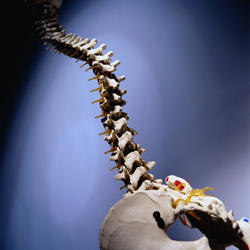Curves Ahead!

Spinal curves allow the spine to support 10 times more weight than it could if it were straight.
Your spine is made up of interconnected bones that provide numerous benefits to the body including:
- Shock absorption
- Balance
- Flexibility
- Movement
The spine delivers these benefits through its spinal curves.
During embryonic development, the spine has only one curve, called a kyphotic curve. Later, as a baby begins to experience significant motor development, such as sitting, crawling and walking, muscles begin to develop. As these muscles strengthen, they cause the formation of secondary curves, called lordotic curves.
Four types of spinal curves:
- Cervical Lordosis
- Thoracic Kyphosis
- Lumbar Lordosis
- Sacral Kyphosis
These curves are important because they allow the spine to support 10 times more weight than it could if it were straight. This is why it is important to follow the procedures for proper lifting. If you bend at the waist to pick something up, the spine straightens, putting you at far greater risk for injury than if you bend at the knees, maintaining the spinal curves, when lifting.
